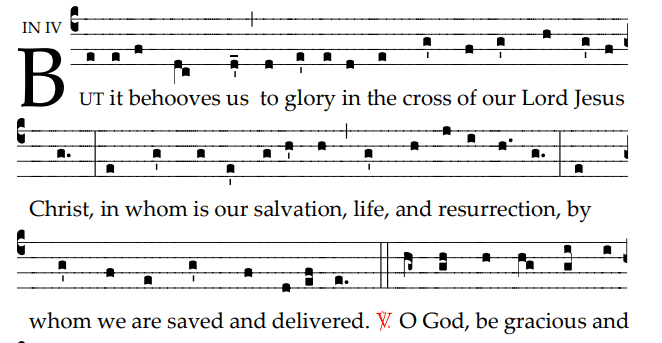This year, I had the privilege of accompanying the entrance antiphon of today’s Mass on the organ: “But it behooves us to glory in the Cross of our Lord Jesus Christ, in whom is our salvation, life, and resurrection, by whom we are saved and delivered.”
It is easy to take the Cross for granted. We forget how radical a symbol it is. Think of modern means of execution—less visibly barbaric, perhaps, but maybe because of that all the more dehumanizing. It’s easier to accept the state killing someone when we aren’t confronted directly with that person’s pain. But still, can you imagine glorying in the electric chair, or fatal injection?
Yet that is precisely what we are asked to do. We are asked to boast—be proud of—an instrument of torture and death, and the fact that the man whom we worship was subject to it. What does this tell us about Christ, and what does it tell us about the Christian life?
Hegel, in his work Phenomenology of Spirit, wrote about what he termed the “master-slave dialectic.” In simplistic terms, he argued that when a slave is subjected to a master, he becomes dependent on the master and defined by him: a slave has no rights of his own, his master has a right over his very existence (as Catholics, we believe in intrinsic rights, but Hegel is concerned with social realities). But in this process, the master is also defined by his slave: his power only has meaning when it is exercised over someone else. Ironically, he can only achieve the status of “master” because his slave exists.
It seems to me that we often approach God as though he ought to be Hegel’s master. In short, we believe he should demonstrate his power over us weak, fallen creatures, or rather, over those other weak, fallen creatures. We wonder how he can allow so much suffering and societal evil, and we wish the forces of good, whether we identify them as the Church, or the political party we subscribe to, or those who agree with us in everyday disputes, would seize power and define reality as we see it for those with whom we disagree. We think the world would be fixed that way.
But in today’s feast, God informs us otherwise. God is not Hegel’s master. God does not need us to demonstrate his power. His might is not defined by his lording it over us. Rather, he chose to triumph by embracing defeat. God conquered the world when it saw the Cross and believed that God had lost. As one of our Easter hymns puts it, “Our guilt is gone, sin’s reign is done, for conquered o’er the conquering won: his anguished death became death’s bane, Christ’s might and power unchanged remain.”
And Christ has called us to be like himself, showing us by the Cross that we ought to define ourselves, not by the power we exercise over others, but by our willingness to embrace suffering, loneliness, and shame for their sake. These become little crosses of our own, united to the one Cross of the Lord, our salvation, life, and resurrection, who by forsaking his power (Philippians 2:5-8) saved and delivered us. By these crosses we recognize that our glory is not in the power we exercise over others but in our union with our Redeemer’s sacrifice.
And so, the Exaltation of the Cross challenges us: are we willing to forsake the strength of the world to glory in the weakness of God? (1 Corinthians 1 :26-24)

Br. Chrysostom Sica professed junior vows in January 2022. His duties include serving as Master of Ceremonies, playing organ for festal masses during the week, taking care of the garden, working in the college, and studying philosophy. Hailing from Moscow, Pennsylvania, he enjoys soccer, chess, and lauding his northern heritage.
